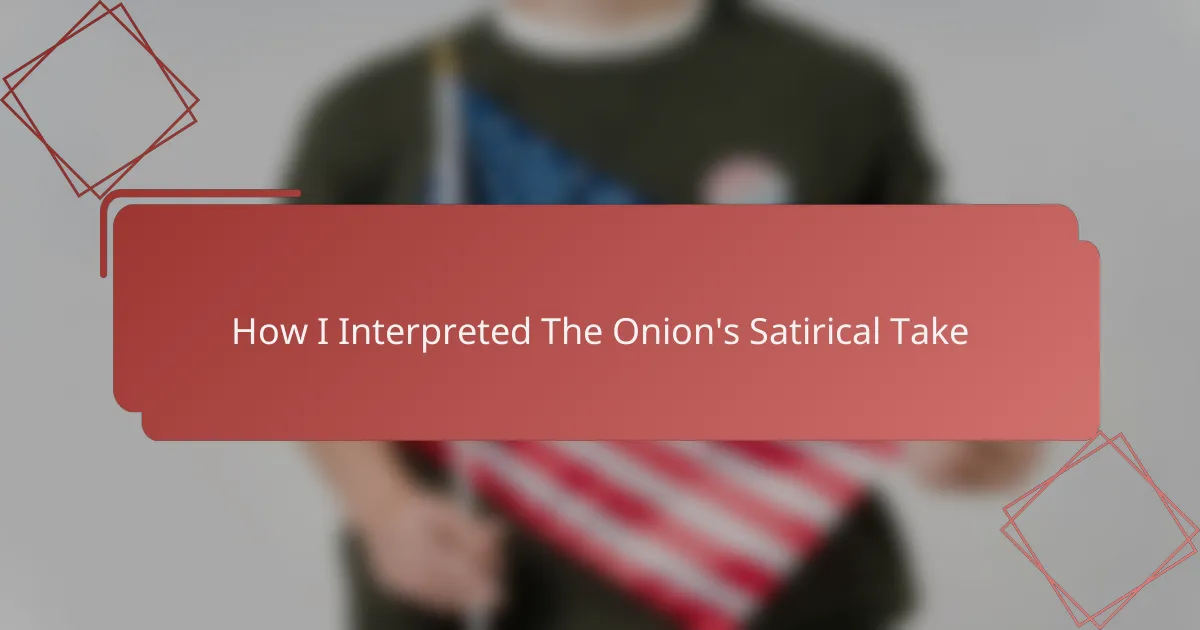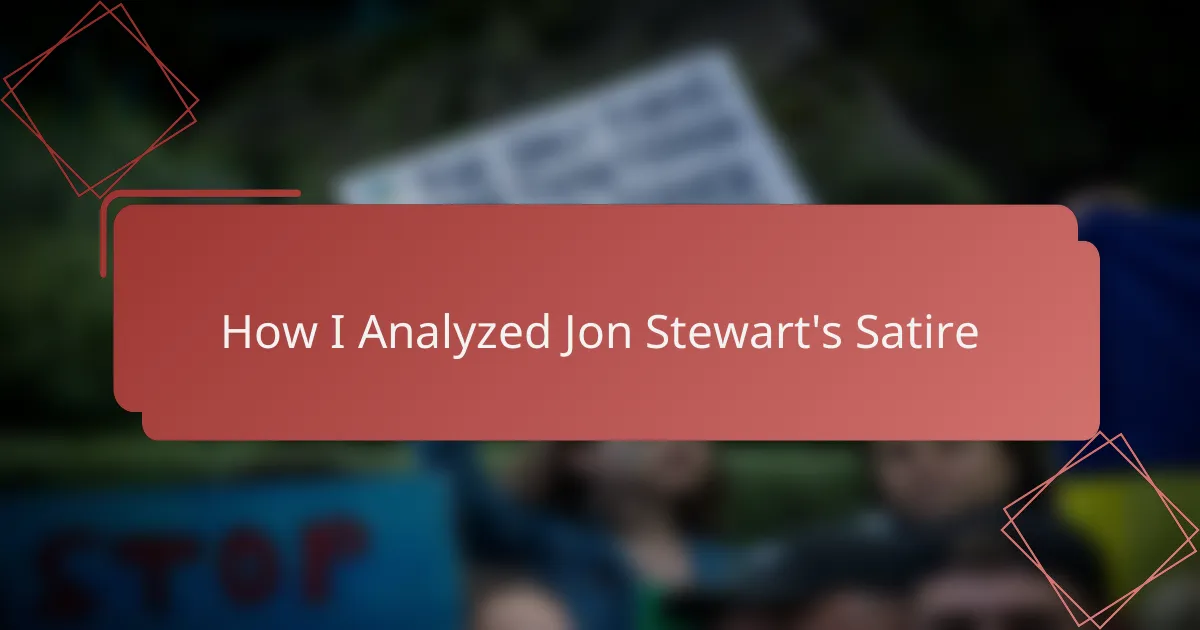Key takeaways
- Political satire, especially from The Onion, uses humor and exaggeration to critique political events and figures while encouraging critical thinking.
- The Onion’s unique style blurs the lines between reality and fiction, challenging audiences to reflect on real-world absurdities.
- Key techniques such as irony, parody, and juxtaposition make complex political issues accessible and spark meaningful discussions.
- Satirical content fosters a deeper awareness of societal issues, prompting individuals to analyze the underlying truths behind the humor.
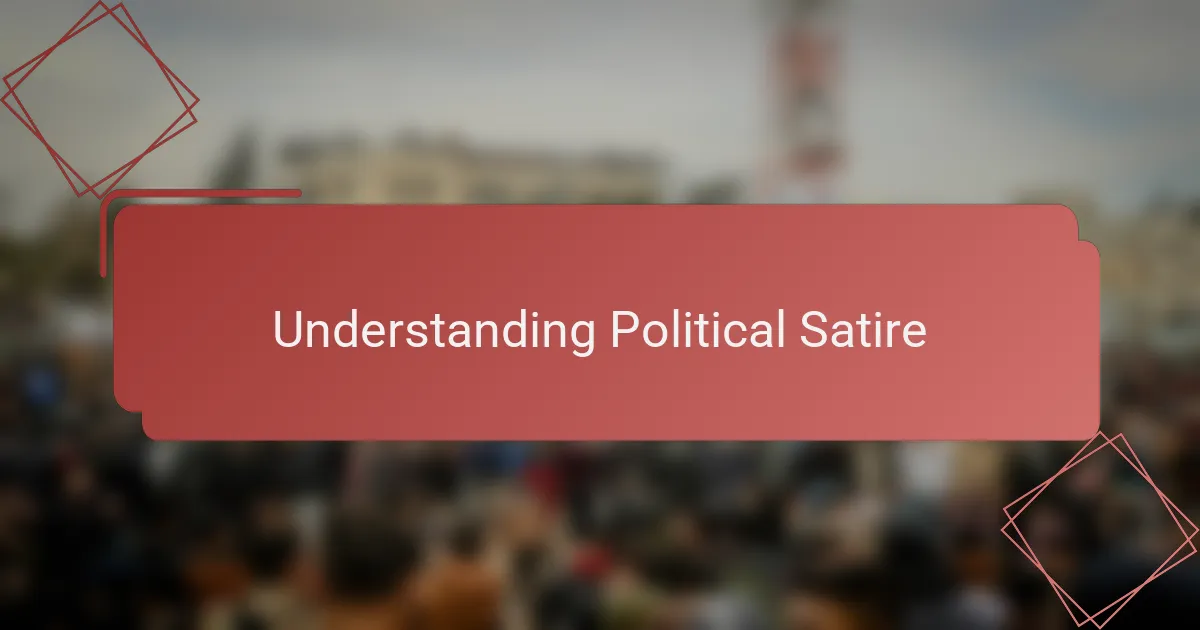
Understanding Political Satire
Understanding Political Satire often feels like deciphering a language of wit mixed with critique. I find that it requires more than just surface-level reading; it demands an appreciation of irony and a willingness to question power structures. When I first encountered The Onion’s pieces, their clever exaggeration made me laugh, but it also pushed me to reflect on real political absurdities.
| Political Satire | The Onion’s Satirical Style |
|---|---|
| Purpose | To criticize political events and figures through humor |
| Tone | Sharp, ironic, often biting |
| Method | Exaggeration and parody of real news |
| Effect on Audience | Encourages critical thinking and amusement |
| Emotional Response | Amusement mixed with a reflective discomfort |
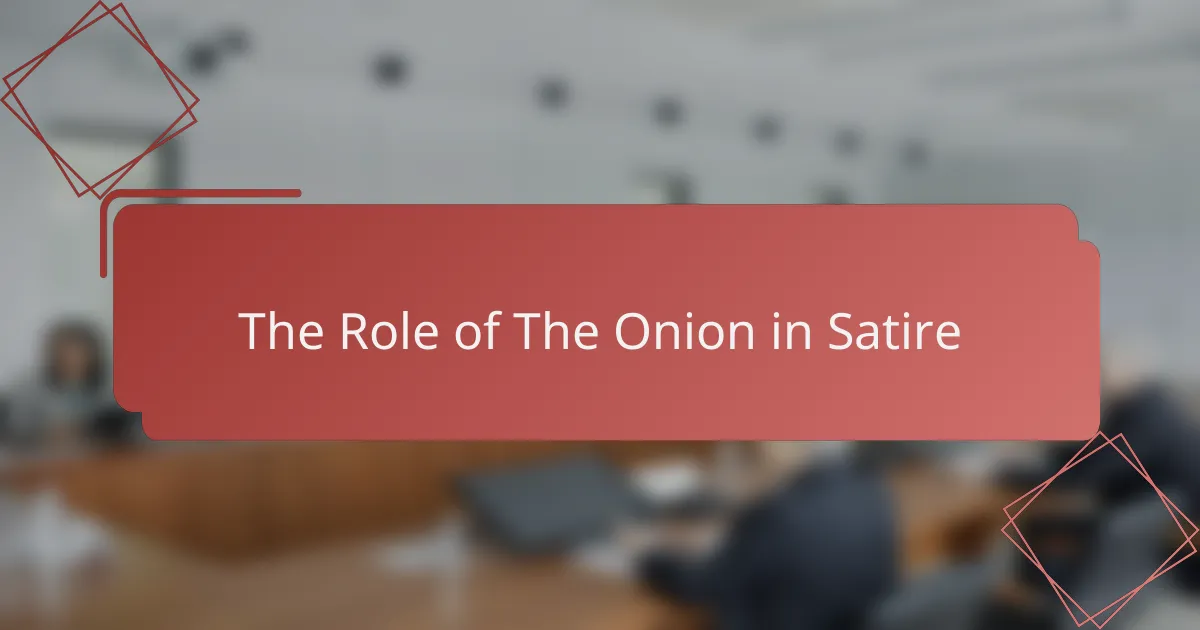
The Role of The Onion in Satire
The Onion plays a unique role in satire by transforming ordinary news formats into sharp, ironic commentaries that reveal the absurdities beneath political events. I’ve noticed that their exaggerated headlines often hit closer to home than straightforward reporting, making me question how much of real news is just as ridiculous. Have you ever read one of their articles and thought, “Is this really that different from the truth?” That moment of blurred lines between fiction and reality is where The Onion’s impact truly lies.
In my experience, The Onion doesn’t just entertain; it challenges me to think critically about the power dynamics at play. Their method of parodying real news outlets feels like holding up a funhouse mirror to politics—distorted but revealing. This approach makes satire accessible and relatable, encouraging audiences to engage in political critique without feeling overwhelmed or alienated.
What stands out most to me is how The Onion manages to blend humor with discomfort. Their biting tone leaves a lingering reflection on the issues they lampoon, making the laughter feel purposeful rather than empty. It’s this combination of amusement and unease that, from my perspective, defines their essential role in the broader landscape of political satire.
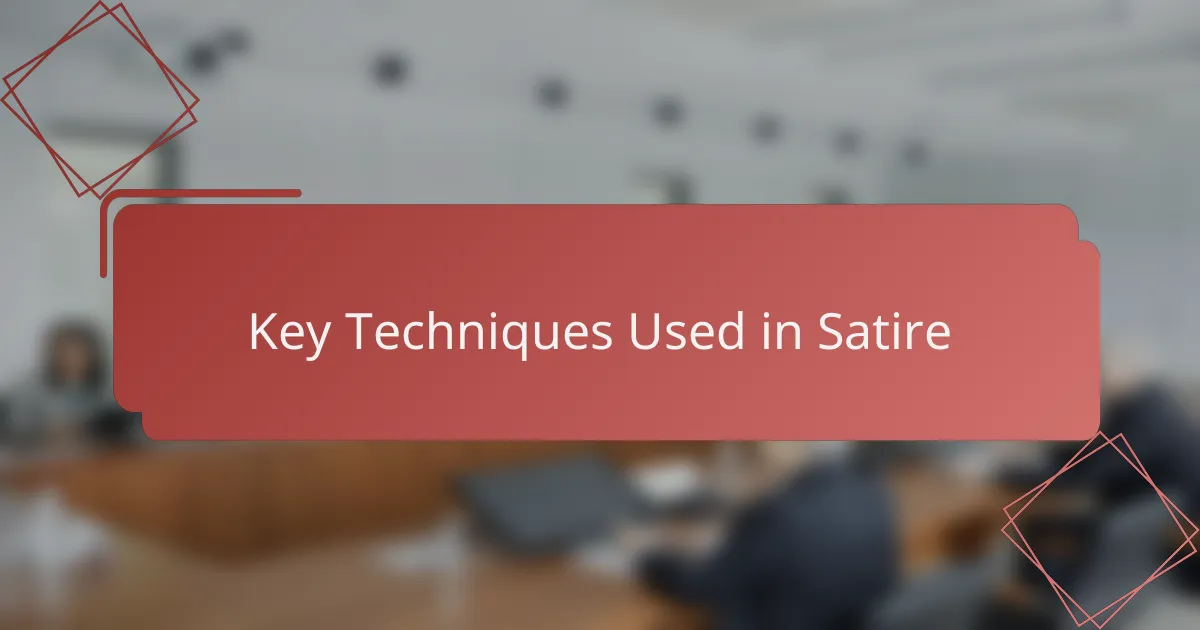
Key Techniques Used in Satire
Satire, especially as crafted by The Onion, relies heavily on exaggeration and irony to expose the absurdity in politics and society. From my experience reading their pieces, this technique doesn’t just entertain—it sharpens critical thinking by making readers question the reality behind the news. I’ve often found myself chuckling, yet reflecting deeply on the serious issues that inspired the satire.
| Technique | How The Onion Applies It |
|---|---|
| Exaggeration | The Onion amplifies real-world events to absurd levels, highlighting the ridiculousness behind political decisions or social phenomena. |
| Irony | They often present situations that starkly contradict expected norms, creating a humorous yet thought-provoking contrast. |
| Parody | The style mimics real news formats closely, which adds authenticity and makes the satire bite sharper. |
| Understatement | Sometimes subtle downplaying of events leads to a dry humor that reveals the underlying truth more effectively. |
| Juxtaposition | By placing contradictory ideas or images side-by-side, the satire illuminates conflicting societal values. |
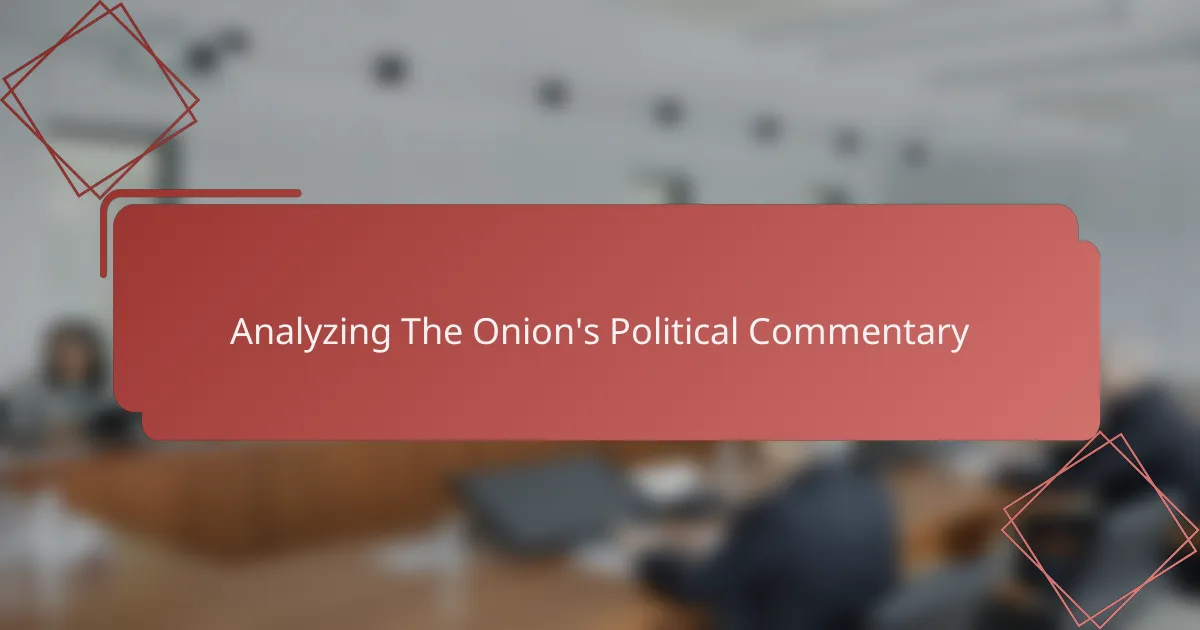
Analyzing The Onion’s Political Commentary
Political satire, especially that of The Onion, often walks a fine line between humor and harsh critique. When I first read one of their articles, I was struck by how cleverly they expose the absurdities within political discourse; it felt like a punch of truth wrapped in wit. This kind of commentary doesn’t just entertain—it challenges me to rethink the narratives I’ve accepted without question.
What stands out to me is The Onion’s ability to distill complex political issues into digestible, often hilarious, snapshots. Their work highlights the irony and hypocrisy in ways that straightforward news never could. From my experience, it’s this skillful blend of entertainment and insight that makes their satire so compelling and worthy of deeper analysis.
- Uses exaggerated scenarios to reveal underlying political truths
- Employs irony and parody to critique public figures and policies
- Highlights contradictions and flaws in political rhetoric
- Makes complex political issues accessible and engaging
- Provokes reflection on societal norms and media narratives
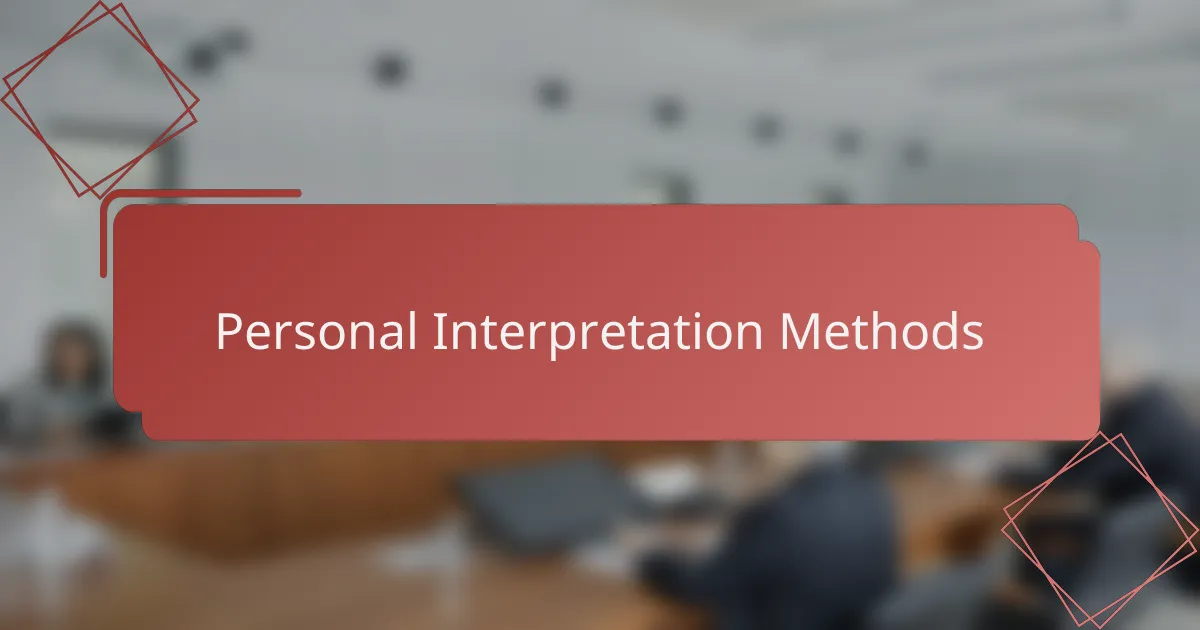
Personal Interpretation Methods
When I approach The Onion’s satire, I tend to start by asking myself what real-world truth lies beneath the absurdity. Often, I find that peeling back layers of exaggeration requires a kind of detective work, where humor is the clue but not the full answer. This method helps me not just laugh but also connect the satire to actual political dynamics I’ve observed or experienced.
I also rely heavily on contextual knowledge—understanding current events and political history gives me a richer backdrop against which The Onion’s parodies resonate. Without that, the satire can feel like a clever puzzle missing key pieces. Reflecting on moments when I’ve missed the point initially, I realize how essential it is to stay informed and curious about the issues being satirized.
Sometimes, I simply let the satire wash over me and observe my emotional reaction—amusement mixed with discomfort is usually a signal that the piece hit a nerve. Why does it feel funny but also unsettling? That question often sparks a deeper reflection on the political realities The Onion exaggerates. This personal, almost instinctual reading method, I’ve found, leads to my most genuine and insightful interpretations.
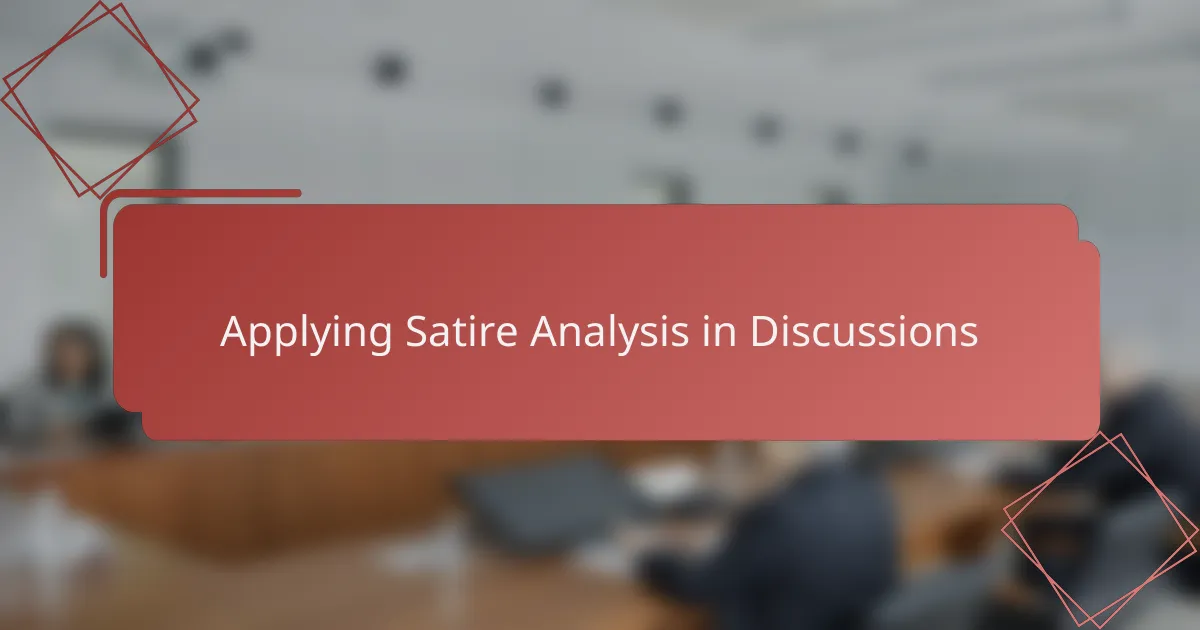
Applying Satire Analysis in Discussions
Applying satire analysis in discussions has always felt to me like a balancing act between humor and critical insight. When I bring up a satirical piece from The Onion, I often notice how it sparks a different kind of conversation—one where laughter opens the door to uncomfortable but necessary political reflections. Have you ever experienced a moment where a joke suddenly made you question your own assumptions? That’s the kind of dialogue satire invites.
I’ve also found that sharing my interpretation of satire encourages others to peel back those layers of exaggeration and irony. In group discussions, pointing out the underlying truths behind the humor helps shift the focus from mere amusement to meaningful critique. It’s fascinating how a well-crafted satirical article can become a springboard for exploring power dynamics and societal contradictions without feeling preachy or dull.
At times, I catch myself wondering if others are really hearing the critique or just enjoying the punchline. That tension—the pull between entertainment and reflection—is where satire analysis becomes both challenging and rewarding. From my experience, approaching these conversations with openness and a sense of curiosity often leads to the most engaging and thought-provoking exchanges.
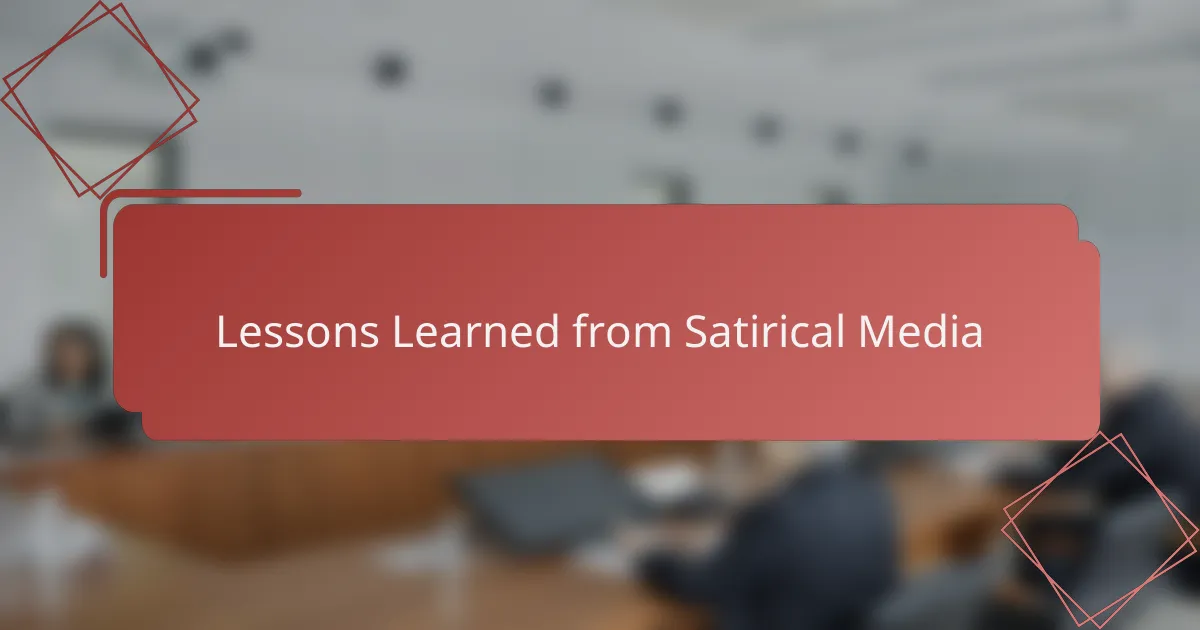
Lessons Learned from Satirical Media
Lessons Learned from Satirical Media has always been a fascinating topic for me, especially when reflecting on The Onion’s sharp wit. Satire, in my experience, acts as a mirror, revealing uncomfortable truths about society that straightforward news often skirts around. What I find most valuable is how satire encourages critical thinking—forcing me to question the absurdities I might otherwise accept without a second thought.
| Aspect | Impact on Me |
|---|---|
| Awareness | Satire heightened my awareness of political and social issues by unpacking them in an amusing yet thought-provoking way. |
| Critical Thinking | It pushed me to analyze the deeper messages behind the jokes, enhancing my ability to spot hypocrisy and bias. |
| Emotional Connection | The humor made the issues resonate on a personal level, making the learning experience both enjoyable and memorable. |
